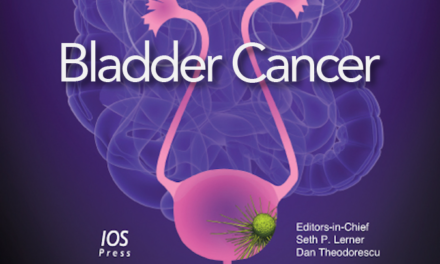Dr. Michael S. Cookson, MD, MMHC, presented “BCG Failure: BCG Maintenance Should be Less Intense” at the 26th Annual Perspectives in Urology: Point-Counterpoint, November 10, 2017 in Scottsdale, AZ
How to cite: Cookson, Michael S. “BCG Failure: BCG Maintenance Should be Less Intense” November 10, 2017. Accessed Dec 2025. https://grandroundsinurology.com/bcg-maintenance-should-be-less-intense/
Summary:
Michael S. Cookson, MD, MMHC argues that, when treating non-muscle invasive bladder cancer patients, BCG maintenance should be less intense than the Southwest Oncology Group’s (SWOG’s) protocol for administering doses suggests. This presentation is a counter-argument to Erik P. Castle’s “BCG Maintenance — Full SWOG Course.”
BCG Failure: BCG Maintenance Should be Less Intense
Transcript:
So really the debate isn’t whether maintenance is there or not, it’s really the duration of maintenance, how long should it go, and do we need full three-year maintenance for everybody? That’s kind of the tact that I took. It ain’t easy to do this though because like I said the data and most of the common knowledge kind of like when you’re talking about testosterone, does it cause prostate cancer, it’s kind of a dogma. But it’s possible that you don’t need that much BCG to be effective. So we know that it was introduced in 1976. They brought out six-weekly treatments. That wasn’t very scientific. That’s what we do every day, and then most of the guidelines recommend some form of maintenance, one to three years, but there is a little bit of wiggle room for giving less.
Individual randomized clinical trials compare BCG induction to maintenance, but that’s like six weeks to lots so there’s not like a two six-week course compared to one, or two, or three years. These recommendations are mainly based on indirect comparisons, and meta-analysis that are pulled together, which may or may not be the best way to do this.
So some of these randomized clinical trials that I’ll show you with maintenance are under-powered. They can lack good quality individual patient data. The meta analysis were indirect comparisons and wide variation in the quality of even the entry to these studies with TUR, for example. No modern-day enhanced technologies like we just showed about blue-light or narrow band and re-treatment for relapse in the failed patients is largely unknown. There are a lot of different maintenance regimens out there. Erik just suggested he high school one.
There is every three months. That didn’t work. There’s a small study. There was monthly maintenance, that too didn’t work, and then there was every six-month maintenance, and that was a negative study, so it was only the Southwest Oncology Group’s randomized trial that did show some separation. There have been seven randomized trials using induction plus maintenance to try to determine this, and all but one of these studies were under powered. And again the largest, most of the data comes from the composite of the Southwest Oncology.
Seven meta-analysis conducted, three included data from observational cohort studies, and I’ll quickly flash forward here and show you some of the data. This just shows you the willy-nilly regimens that were used for maintenance. There were various schemes as I pointed out and not a lot of winners in terms of proof. The enrollment numbers of patients in each study really varies. The composite is over 800 patients, but are we really comparing the same thing when we lump all of these different trials together concerning recurrence? Three out of seven studies found no evidence for clinical benefit of maintenance BCG therapy. Two studies reported non-significant trends favoring it, and only two studies reported significant differences in favor of maintenance. So it’s not clear that longer is always better for these patients.
The Lamm study was the only one that demonstrated reduction in disease progression with maintenance, but the progression definition was broadly defined as this worsening free survival. So that included patients who did progress to muscle invasive, but it also was change in therapy, death due to any cause, so there’s a lot of wiggle room in the definition of worsening free survival, which is kind of the backbone for defining progression in this study. So the three-year maintenance data is mainly based on the SWOG study. There was about a 20% advantage in that study if we looked at it before, but the results can be viewed cautiously.
And so smarter people than me have looked at this to criticize it, but I’ll give you some of the highlights. For recurrence free survival, if a patient died it was counted as an event, not died of bladder cancer, just died, so the recurrence free survival data is contaminated, and there were like 50 deaths or one in five of those recurrences were actually just patients dying. So how good is that data really? It is a comorbid population exposed to toxic therapies, so I think that worsening free survival for progression is also a suspect limitation of the data. This is the biggest criticism, number two.
So one, recurrences, we counted deaths that really aren’t recurrences, and on the worsening free survival, we do include progression but change in treatment that could be just an individual doctor. Deaths are also in there, and so there’s a lot of under reporting of some of this stuff that really should have been and probably wouldn’t pass the muster if we were analyzing this study today. Statistically speaking, and I’m not a statistician, but they could have used a more powerful P value, a two-sided T test, for example, and if they would have doubled that P value, like most people would demand them to do today if they were doing the study, it would not have been a significant outcome. The worsening free survival would have been 0.08, so there are some chinks in the armory here. 30% of patients that were initially randomized in the study were just excluded because of evidence of disease at randomization, so they didn’t include—it wasn’t like an intent to treat analysis, which also could be criticized if you were really looking at this in terms of a modern-day review.
So toxicity and compliance were also noted. Approximately 50% of the patients treated with BCG had some side effects. 5% of those were deemed to be pretty serious in the patients on that longer, and only about 16% of the patients in a clinical trial that was designed to go three years could actually go the distance, so that tells you something right there. In the EORTC study they had a little bit better success with getting people to go a little bit longer. Nevertheless about 20% had to stop due to some form of toxicity.
Now, Erik Castle pointed out, we don’t see a lot of people getting admitted for BCG-osis these days, and it is fortunately pretty rare, but having to stop is common, and that is due to more local symptoms and low-grade fevers, etc. The EORTC study that we highlighted showed that three years isn’t for everybody. In fact one year was enough for the intermediate risk patients, and three years was recommended for the patients that were getting with CIS and T1 disease. So that really kind of tells you that not everybody needs the full course.
So, summary, he quality of the TUR limitation, they didn’t use enhanced technologies to try and ferret out some of the people to try and enhance the results with shorter duration of BCG, and we definitely know that there is a therapeutic benefit to shorter duration for some patients and up to a year and in fact some of the guidelines like the European one often will suggest get them to a year and see how it goes.
So I think that it isn’t a given that everybody needs like three years of maintenance. For individuals it may be different. One size doesn’t fit all. Optimal duration of therapy is to be determined. So with that I’ll stop, and hopefully we won’t have the kind of Erik versus Mike discussion that David had earlier today. So thank you for your attention on that, and I don’t know if it’s time to vote. Does everyone need three years or not? Let’s do it. In the interest of time, let’s do a vote, and then Erik is going to come up and give another talk.
So do we need to pick? Who is A and who is B? Do we have any asleep at the wheel back there? Remember we’re voting does everyone need three years? It’s not an anti-SWOG study. All right, we’ll take it. I couldn’t beat Don Lamm I can tell you that. So thank you.
ABOUT THE AUTHOR
Michael S. Cookson, MD, MMHC, is Professor and Chairman of the Department of Urology and holds the Donald D. Albers Endowed Chair in Urology at the University of Oklahoma Health Sciences Center in Oklahoma City. He has authored some 240 peer-reviewed journal publications as well as more than 30 chapters of various textbooks, and he is nationally recognized for his outstanding contributions to urologic oncology. Dr. Cookson completed his Urology residency at the University of Texas, San Antonio, and completed his Urologic Oncology fellowship at Memorial Sloan-Kettering Cancer Center in New York. From 1998 to 2013, he served as the Vice Chairman of Urologic Surgery and Director of the Urologic Oncology Fellowship Program at Vanderbilt University in Nashville, Tennessee.





